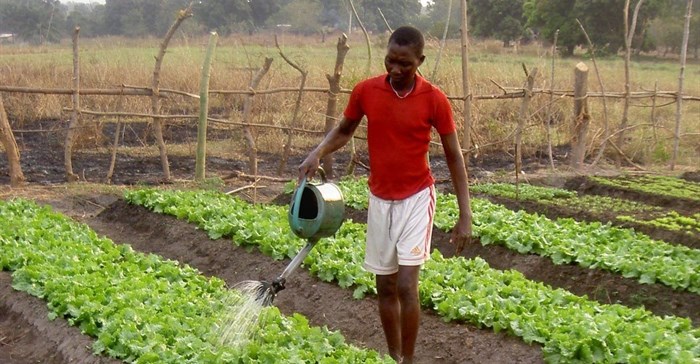Kitchen gardens cultivate bond between refugees, Kenyan hosts

The sunken bed technique
Murenzi is one of many refugees who have embraced small-scale farming on the land behind their shelters in Turkana County's Kalobeyei camp.
The tiny plots measure five metres (16.4 ft) wide and six metres long and are cultivated using a method known as sunken beds. This involves digging a hole 45cm (17.7 inches) deep and filling it with 20cm of top soil. The remaining soil is mixed with manure and spread on the land again, adding another 20cm.
The sunken bed technique allows the soil to hold water for longer, enabling crops to grow to full maturity. The beds harvest rainwater and are built to retain moisture, even making use of the small amounts of wastewater flowing from homesteads.
Rose Ibalu, a single-parent refugee from South Sudan, uses waste water to irrigate the kale and okra she plants in her garden. The $14 her family receives each month for food from the United Nations is not enough to cater for her seven children and herself, she said. "I still need to buy charcoal to cook food, and also sugar and tea leaves which are not included in the cash voucher. The garden is my only hope for survival," she said.
Murenzi and Tereza Mutenga, a refugee from the Democratic Republic of Congo, said their limited cash income had previously forced them to exchange food rations for charcoal produced by the local community to meet their energy needs. But Murenzi can now buy charcoal after selling the fresh produce he grows, as well as supplementing his diet with it.
Self-reliance
The kitchen gardens are part of a €15m ($17.6m) social and economic development project for the area, funded by the European Union Emergency Trust Fund for Africa and implemented with support from the Turkana County government and UN aid agencies. The 14-year project, which ends in 2030, aims to provide refugees with sustainable livelihoods through agriculture while helping them integrate with their host community. It is the first of its kind in Kenya, UN officials said.
Maina Kibata, an official with the UN Food and Agriculture Organization (FAO), said donors had cut funding for humanitarian relief in Kenya in recent years, partly due to wars in the Middle East. "The funds might continue to dwindle if conflicts in countries like Syria persist," he said. "Activities like agriculture can offer an alternative livelihood to refugees and make them self-reliant."
The FAO's Kalobeyei field coordinator said Kenya continues to experience an influx of refugees, underlining the need to help them become economically self-sufficient and less dependent on aid.
Turkana County, which donated 1,500 hectares (3,707 acres) of land for the Kalobeyei refugee settlement of around 60,000 people, wanted a project that would help bring the new arrivals and locals together, said Kibata. The county government hopes to avoid the situation around nearby Kakuma camp, some 40km away, where the host community felt they did not benefit from the refugees' presence.
The Turkana authorities are also keen to make Kalobeyei sustainable long after the refugees leave, to avoid a repeat of the situation in 2005 when Lokichoggio camp was relocated to South Sudan, causing local investors to incur heavy losses. In Kalobeyei, the goal is for the local community of around 20,000 people to take over the refugees' small-scale farms if and when they go home, allowing the area to remain productive.
Humphrey Emuria, sub-county agriculture officer for Turkana West, said food produced by the Kalobeyei refugees had also gone a long way to lower the cost of living both for them and their host community.
But some refugee farmers have complained about water rationing introduced by the UN refugee agency (UNHCR) after it discovered they were irrigating their gardens with fresh water from their daily quota. Emuria said the small water channels irrigating the gardens were meant to use waste water and tap spillage only, to help avoid wider water shortages in this semi-arid region.
Business partners
Given Turkana's low rainfall, the area is sorely in need of rainwater harvesting techniques such as sand dams and underground water tanks. In addition, its soils and water are saline and struggle to support agriculture. The majority of local people keep livestock - mainly sheep and goats.
But technologies like sunken bed farming and irrigation enable them to use stored rainwater to cultivate crops.
Community members participating in the farming project are trained to plant sorghum using a method in which a sand barrier is built in front of the growing area, capturing rainwater and releasing it slowly, said Emuria. When the sorghum ripens, the local farmers sell it to the FAO, which grinds it and uses it to feed the refugees. "It's a win-win for everybody," he added.
The Turkana government and the FAO are due to set up an irrigation system on a 400-hectare piece of land set aside for farming in Kalobeyei, once the Red Cross finishes building a dam in the area, he said.
"Initially the host community did not want to be associated with the refugees due to the stigma the name 'refugee' holds," said Emuria. "But nowadays, they see them as essential business partners."
($1 = 0.8538 euros)
Reporting by Benson Rioba, editing by Megan Rowling.
The Thomson Reuters Foundation is reporting on resilience as part of its work on zilient.org, an online platform building a global network of people interested in resilience, in partnership with the Rockefeller Foundation.
Source: allAfrica

AllAfrica is a voice of, by and about Africa - aggregating, producing and distributing 2000 news and information items daily from over 130 African news organisations and our own reporters to an African and global public. We operate from Cape Town, Dakar, Lagos, Monrovia, Nairobi and Washington DC.
Go to: http://allafrica.com/






















